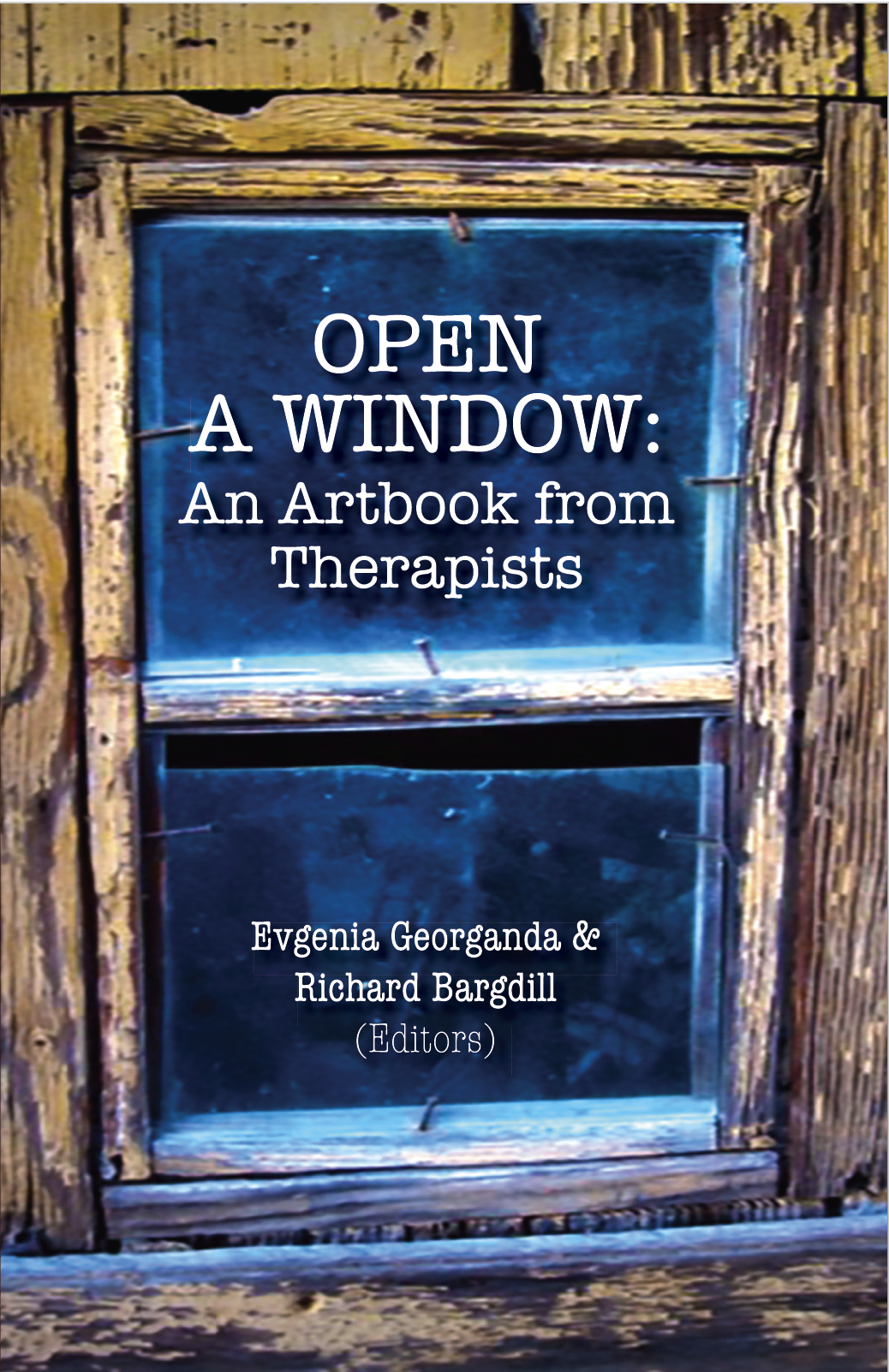 Evgenia Georganda, PsyD, ECP, is an Existential-Humanistic therapist, member of the American Psychological Association (APA), and of Division 32 of Humanistic Psychology. Evgenia is a certified psychotherapist and member of the European Association of Psychotherapists (EAP), the Federation for Existential Therapy in Europe (FETE), the Hellenic Psychological Society (HPS), and the Association of Greek Psychologists (SEPS). Evgenia has taught psychology at both graduate and undergraduate programs in private colleges and the Greek University as well as lectured and run seminars both in local and international congresses. She is the author of three books and two albums from her solo photo exhibitions and has written articles for journals and collective works both in Greece and abroad. In her effort to make existential psychotherapy known to the Greek community, she co-founded “gignesthai”, the Hellenic Association for Existential Psychology, where she is chief administrator, trainer, and supervisor. For her contribution in promoting existential psychotherapy in Greece, she was nominated for the Charlotte and Karl Buhler Award in 2018. Evgenia has served as secretary on the Board of Directors of the National Organization of Psychotherapists of Greece (NOPG) and membership secretary and member of the Board of Trustees of the Federation for Existential Therapy in Europe (FETE).
Evgenia Georganda, PsyD, ECP, is an Existential-Humanistic therapist, member of the American Psychological Association (APA), and of Division 32 of Humanistic Psychology. Evgenia is a certified psychotherapist and member of the European Association of Psychotherapists (EAP), the Federation for Existential Therapy in Europe (FETE), the Hellenic Psychological Society (HPS), and the Association of Greek Psychologists (SEPS). Evgenia has taught psychology at both graduate and undergraduate programs in private colleges and the Greek University as well as lectured and run seminars both in local and international congresses. She is the author of three books and two albums from her solo photo exhibitions and has written articles for journals and collective works both in Greece and abroad. In her effort to make existential psychotherapy known to the Greek community, she co-founded “gignesthai”, the Hellenic Association for Existential Psychology, where she is chief administrator, trainer, and supervisor. For her contribution in promoting existential psychotherapy in Greece, she was nominated for the Charlotte and Karl Buhler Award in 2018. Evgenia has served as secretary on the Board of Directors of the National Organization of Psychotherapists of Greece (NOPG) and membership secretary and member of the Board of Trustees of the Federation for Existential Therapy in Europe (FETE).
Books by Dr. Georganda Published by University Professors Press
Open a Window: An Artbook from Therapists
by Evgenia Georganda & Richard Bargdill
Click here for more information!
.
.
.
.
Publications
Georganda, E. T. (2022). Becoming: An existential-developmental understanding of human dilemmas and existential psychotherapy. Journal of the Society for Existential Analysis, 33(2), 309-324.
Georganda, E. T. (2021). The therapeutic relationship in the existential-humanistic approach. Psychology: The Journal of the Hellenic Psychological Society, 26(2), 53–64. https://doi.org/10.12681/psy_hps.26897
Georganda, E. (2020a). Becoming: An Existential/ Developmental Understanding of Human Existence & Growth. Existentia: Psychology and Psychotherapy. 13, 97-116.
Georganda, E. T. (2020b). Eros, Thanatos and the Awakening of Oistros: Being in Love with Life and “Our World”. The Humanistic Psychologist. 48(2), 133-141. http://dx.dol.org/10.1037/hum0000142.
Georganda, E., Correia, E., Berra, L., Icoz, J., Menda, G. & Shalom, Y. (2019a). Southern Europe. In: The Wiley World Handbook of Existential Therapy. Eds. Van Deurzen,
Craig, Langle, Schneider, Tantam, DuPlock. NJ: Wiley Blackwell. (pp. 552-567)
Georganda, E. (2019b). Attachment and Affect Regulation Theories and the Existential
Developmental Model. Journal of the Society for Existential Analysis 30(2) Pearl Edition: 239-248.
Dallas, E., Georganda, E. T., Harisiadis, A., Kourtis, A., & Zymnis-Georgalos, K. (2019). The myth of Zorba the Greek and the existential concept of “Oistros”. In L. Hoffman, M. Mansilla, J. Dias, M. Yang, M. Moats, & T. Claypool (Eds.), Existential psychology east–west (Vol.2, pp. 255–262). University Professors Press.
Georganda, E. (2016a). Throwness, Freedom and the Will for Authenticity: An Existential – Developmental Approach to Psychotherapy. Journal of the Society for Existential Analysis 27(2): 261-276.
Georganda, E. (2016b). The paradox of attachment theory and free will. Journal EPOCHE: Psychotherapy, Phenomenology, Hermeneutics. Vol 2, 79-89.
Dallas, E., Georganda, E., Harisiadis, A., & Zymnis-Georgalos, K. (2012). Zhi Mian and «Oistros» of life. Journal of Humanistic Psychology, 53, 252–260. https://doi.org/10.1177/0022167812468791
Georganda, E. (2012/ 2020). The Process of Psychotherapy. Kondyli publications, Athens.
Georganda, E. (2009/2016). Journey into Emotions: Existential theory in my life. Plithora publications, Athens.
Georganda, E. (2007). Capturing the Moment. Photographs and excerpts from the writer’s journals (1980-2007). Asprilexi publications, Athens.
Georganda, E. (2007) The DNA of the Soul: Integrating developmental issues with existential-humanistic theory. The British Journal of Psychotherapy Integration: The Integrative Project in Practice. Vol.4, Issue 1, 4-12.
Georganda, E. (2005). The Water and the Dream. Galerie Zygos publication.
Georganda, E. (2002). What is Psychotherapy. Assimakis Publications, Athens.
Georganda, E. (1999). Existential Psychotherapy. In Current Psychotherapies in Greece. P. Assimakis (Ed.), University of Indianapolis, Athens Press, Athens.
Georganda, E. (1994). Psychological Aspects of Thalassemia. In What is Thalassemia? Vullo, Modell, Georganda (Eds). Thalassemia International Federation Publication, New York.
Georganda, E. (1993). Psychosocial Aspects of Genetic Blood Disorders. TIF News, Issue No.9, 10-11.
Georganda, E. (1993). The Search for Answers to Troublesome Questions. Themata, Vol.9, 12-15.
Georganda, E. (1990). The Impact of Thalassemia on Body-Image, Self-Image, SelfEsteem. Annals of Sixth Cooley’s Anemia Symposium. The New York Academy of Sciences. Vol.612, 466-472.
Georganda, E. (1990). Thalassemia: How a Chronic Illness affects the Psychological Adjustment of the Individual. Kinis, Vol.2.
Georganda, E. (1988). Thalassemia and the Adolescent: An Investigation of Chronic Illness, Individuals, and Systems. Family Systems Medicine, Vol.6(2)
Georganda, E. (1987).The Psychological Development of the Thalassemic in Modern Greek Society. Kinisi, Vol.2.
Georganda, E. (1986). Thalassemia: The Psychological Aspects of a Chronic Illness. Themata, Vol.10.
